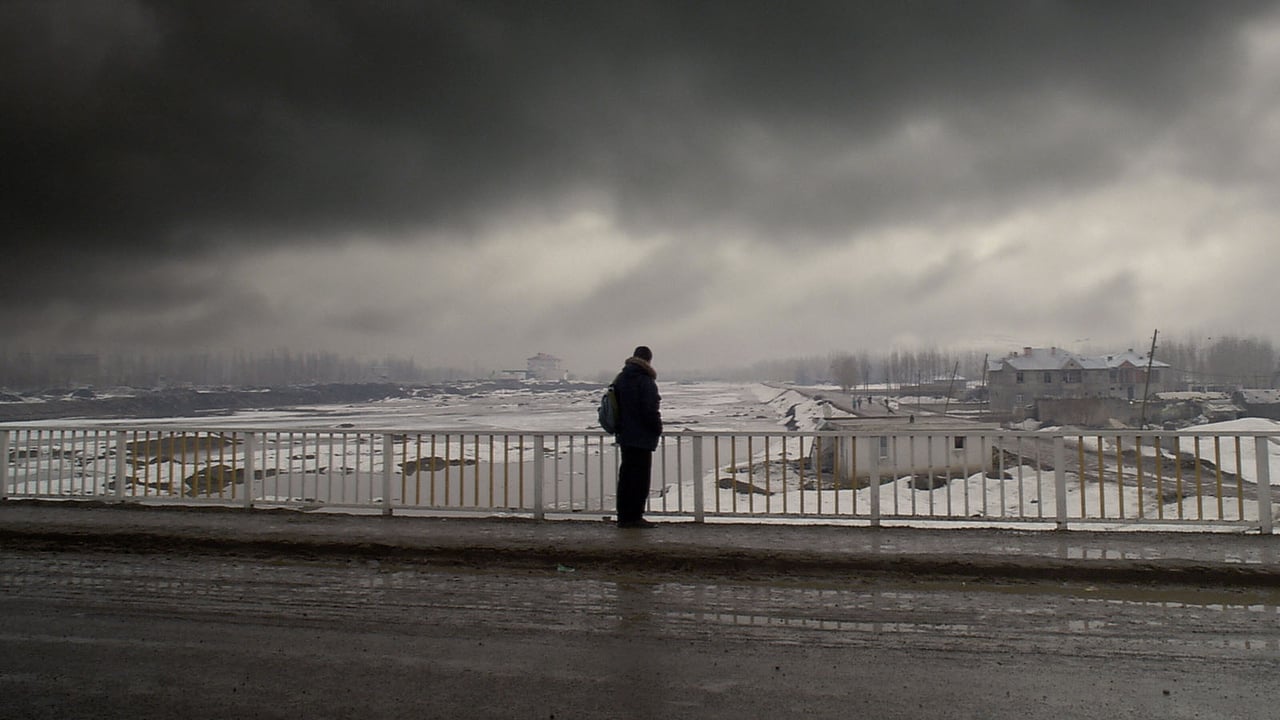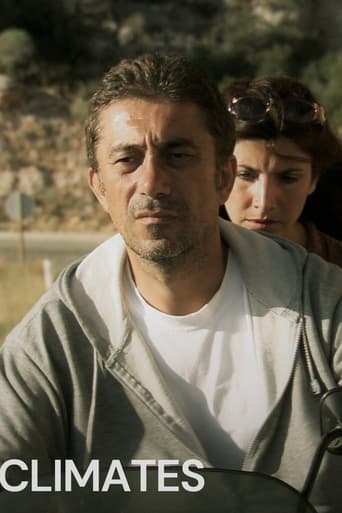Konterr
Brilliant and touching
2freensel
I saw this movie before reading any reviews, and I thought it was very funny. I was very surprised to see the overwhelmingly negative reviews this film received from critics.
Tyreece Hulme
One of the best movies of the year! Incredible from the beginning to the end.
Claudio Carvalho
In Turkey, the middle-age University Professor Isa (Nuri Bilge Ceylan) and his younger wife Bahar (Ebru Ceylan), who works in television, are spending summer vacation in Kas. After a couple of days, Isa decides to separate from Bahar since they do not communicate with each other. Bahar returns to Istanbul alone and then she travels to the countryside to work in a new project. Meanwhile Isa meets his former lover Serap (Nazan Kirilmis) with his friend Guven (Can Ozbatur) and later he rapes her in her house. Then he travels to meet Bahar and propose her to move in together again. What will be her decision?"Iklimler", a.k.a. "Climates", is a boring and overrated Franco Turkish romance. The pace is too slow and the lead couple shows no chemistry and charisma. However the cinematography and landscapes are stunning. Despite the hype, this film is annoying and pointless. My vote is four.Title (Brazil): "Climas" ("Climates")
Tim Kidner
Nuri Bilge Ceylan's relationship dramas are loved by the critics, who can see all that pure unadulterated misery in all its perfectly shot scrutiny. They can revel in its rawness and honesty.For the rest of us, who've got our own problems to think about and contend with, having someone's else's graphically thrust upon us for near two hours is just a bit much. I'd bought his previous 'Uzak' on DVD, believing it to be the best film of the year. It wasn't - and isn't.I watched 'Climates' on late night TV because I should, because critics and those that "get" Ceylan tell us we should. And just to prove my preconceived idea that I won't like it, wrong. I'm finding the characters no more agreeable - one asks if such dissatisfied people actually deserve loving partners the way they behave.It's not all total misery, of course. There are bits that should be applauded. As others have said, the cinematography, for instance. The beach scene at the beginning with its selective focus is superbly done (I'm a photographer myself, so can appreciate).Whilst it would be against his style and selfish of me to expect Ceylan to jolly up his films - there is almost no incidental music, for instance - I'm sure a few would wish he did. That he won't and I wouldn't expect him to, I could simply just not watch his films. But, there is always that nagging feeling that I'm missing out if I don't.
FilmCriticLalitRao
By making "Iklimler/seasons",one can guess that Turkish director Nuri Bilge Ceylan wishes to suggest that why should one bother about Turkish bourgeoisie ? These days globalization ensures that more and more bourgeois societies are created.Does that mean that hapless viewers must bear severe punishment of seeing aimless lives of bourgeois people ? There are not many viewers who know that great Senegalese director Ousmane Sembene snubbed an inefficient African bourgeois in his masterpiece film "Xala".His film is about an African man who imported mineral water to wash his car.This kind of frivolity is what one can expect from bourgeois people whether from Africa or Turkey.In the same manner why should one care about bourgeoisie in Turkey whether they buy an expensive coat in London or setup an advertisement agency in Kazakhstan.Everybody is aware of the fact that actions of bourgeoisie are not going to heal the world.There are golden moments of silence in the games of young bourgeois people based in Turkey.Apart from being a professional director,Nuri Bilge Ceylan has made himself known as a shrewd businessman as he has put all members of his family in front of camera including his old parents.This is one of the best examples of cinematographic narcissism in recent times.It is really a pity that even the presence of a character named Bahar/spring does not really bring any freshness to this film.All viewers must question why should anybody blame seasons for irresponsible behavior ? We are all aware of the fact that due to global warming there would be bad weather for everyone.Does that mean that even bourgeois morals are going to be affected ? My last word is that one must see this film only for its photography.
fatma-sarikaya
I had high hopes for this Turkish movie, since i have heard/read a lot of the hype around this movie. I was seriously disappointed: by the lack of depth of the characters , especially the directer playing Isa, he is just portraying a cliché of a Turkish man not able to communicate his feelings, he is being a total bastard and not able to learn and develop as the film progresses. (Obviously my husband totally disagrees!!!) The disturbing sex scene with Serap reminds me of cheap Turkish movies from the seventies, where men rape Turkish women in the same manner - only that Serap seems to somehow enjoy this (very annoying laughter) What i liked very much is the scenery and Bahar sweating on the beach, which looked just beautiful. But there was nothing of a "true soul" except Bahars face turning from a smile into rolling down tears from her face.

